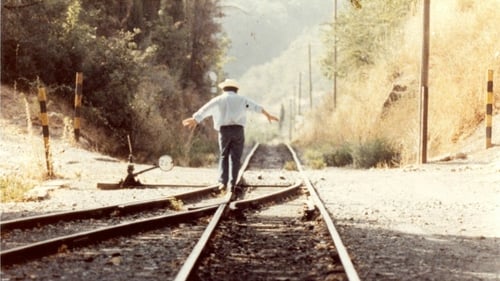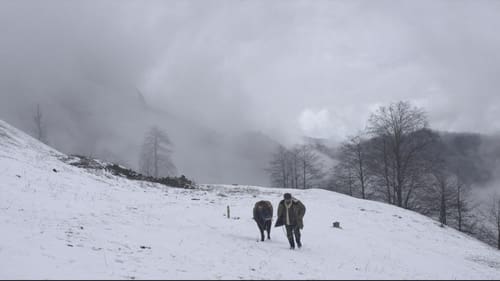The Factory (1981)
장르 : 드라마
상영시간 : 1시간 41분
연출 : Tasos Psarras
시놉시스
A tanner, swamped with debts, must abandon his trade and go work in the local factory.

The ruins of paganism and the birth of Christianity portrayed by immobile people along with music.

A typical experimental film, in which a variety of audiovisual techniques are used to create the sense of polymorphic eroticism as developed by European and Mediterranean cinematography of the 20th century. Combining the methods of “animation” and “live action”, this intricate work embodies the idea of an “ars combinatoria”. The structure is loose, with neither a central axis nor a point where everything converges, contributing greatly to the open-ended character of the film, where rhythm is the key element.

A surreal account of Lizzie as she struggles to make life fit.

Stavros and Charlotte - i.e. the director and his partner in life and art, Charlotte van Gelder - are wandering the streets of a burdensome reality like immigrants, tracing the world around them through friendships, journeys and political quests. Made with minimal means with a few rolls of black and white film they managed to scrape together, this is a thoroughly unconventional film that defies traditional narrative structures, spectacularly revealing the director's true vision: a primordial cinema full of imagery that comes out of nowhere and communicates freely, like a small wonder. A large slice of the international film critic community - including Frenchman Louis Skorecki who described the film as a comet - will adore "Coatti" and continue to support Tornes' lonely path until the end.

A blacksmith and a car mechanic, harboring a hostile relationship they inherited from their grandfathers, must come to terms with a new way of dealing with each other, when the blacksmith faces economic struggle and the mechanic offers to buy him out.

A sociology professor going through a mid-life crisis resigns from his job, abandons his family and lives isolated in his country house. His only incentive for living is the faded face of an unknown girl in a photograph he had taken in the past and whom he now starts looking for.

Ricky rides her motorcycle among real and imagined dangers, to arrive unscathed, but unalterably changed, at the end of summer. The unrelenting wind of the season disrupts a landscape of inaction, theft and drug use. The end of innocence has already begun and a new path, dark and hopeful, stands waiting like the ships beyond her window. It will be an act of violence that thrusts the girl into womanhood and leads her to a new life where, not without pain, everything is possible.

The friendship between two young boys during the summertime in 60's Chios Island.

Eva, a young woman and a student of classical singing, decides to meet her father, who is unaware of her existence. Thomas works as a guard in a truck lot. He lives in a container and aspires to nothing. Their meeting will be a meeting of two different worlds and the relationship they develop will be all their own; a relationship beyond easy classification. (Thessaloniki International Film Festival)

A documentary about Eleusina. The past and the present, in complete antithesis, coexist in a place spoiled by modern industry but which long ago hosted the Eleusinian Mysteries, the secret ceremonies that initiated the ancient Greeks into the miracles of life, death and the afterlife.

In Variations, Angelidi creatively activates her knowledge of the history of the cinematic image and connects it to a global artistic language of an alternative, poetic cinema, while still preserving the peculiarities of her own tradition and, especially, her personal concerns. Angelidi -who appeared with the film Idees Fixes - Dies Irae (Variations on the Same Theme) in 1977 is classified among the filmmakers who emerged in the seventies with films that were "different", from an aesthetic viewpoint, and who proposed "another" kind of narrative

Edyta is forty and in the midst of a crisis. She has left her family, her husband and son and their house on the Baltic Sea behind her. She spends her nights in a Warsaw hotel room and her days driving around the unfamiliar city. When she runs out of cash, she hatches a plan: An ad in the newspaper – sex for money. Edyta never lets things get that far though, as she drugs her clients and then uses their apartments as a refuge for the night. Then she meets an artist, Patryk. A smidgen of luck and Edyta can no longer maintain her dismissive attitude. In this enthralling character study, Tomasz Wasilewski uses filmic minimalism to ensure that glances and gestures say more than words. He portrays a lonely woman in both fragility and strength, using precise image composition.

In this avant-garde look at a series of unique or eccentric men and women, director Stavros Tornes has created a film that is visually engaging, but too obscure in many points to be understood. The main protagonists are a young taxi driver -- a man who has had some very unusual, puzzling, and inspirational experiences -- and a middle-aged painter he gains as a new friend. The two men are complemented by a few tough women (all played by the same actress), a pair of verbose politicos, and a handful of other distinctive characters. By the end of the movie, transformations are in store for the pair of friends, reflecting the tenor of the film throughout. ~ Eleanor Mannikka, Rovi

“Wild Duck” is the story of Dimitris, a telecommunications engineer who’s forced to shutter his business after running up a considerable debt with a local loan shark. He and his buddy Nikos, another telecommunications expert working for a big outfit, decide to get to the bottom of a big scandal. Their research leads them to a certain apartment, whose tenant Panagiota becomes the focus of their attention. Dimitris is now facing some major dilemmas and a trip to his hometown will help him clear his head and look at himself under a different light.

Twelve-year-old Vasilis escapes the orphanage, wanders a while in the capital and then takes the train for his hometown, Tripolis. As he wanders through the mountains of Arcadia, he meets a girl whose car has broken down. They become friends and spend the summer together, until Vasilis returns to his grandmother's house, which he finds abandoned and in ruin. The girl disappears, and Vasilis, deserted and alone, takes the road to Tripolis, where, in order to make ends meet, he performs odd jobs. On the day celebrating his patron saint, however, he abandons the city and takes the road back to his village.

Ten years after Mondovino, his analysis of the increasingly standardised wine production in France, wine expert Jonathan Nossiter picks up the thread again and shows what it means to be rooted in the soil you're working on. During walks through the vineyards and relaxed gatherings with a group of alternative Italian wine growers, he trades experiences and arguments. What looks like a bucolic paradise, where intelligent people produce wine according to time-honoured and organic methods, is actually revealed to be a battleground. The DOC association, which is supposed to look after the interest of independent vintners, promotes winemakers who produce vast amounts in a standardised quality; and the agricultural industry with its hygiene regulations excludes traditional methods of production. The only thing saving the landscape from being totally destroyed is affluent foreigners using the old vineyards as summer holiday homes.

1962 is the year when an entire generation lives life as though it was their last day. Young activist Eik Skaløe has his entire life turned upside down when he falls head over heels in love with the beautiful peace activist Iben Nagel Rasmussen, and she falls in love with him. But Iben is a child of the times, and freely accepts the order of the day: free love and sex. She renounces personal right of ownership and will not settle for one man when she can have several. In typically romantic fashion, he begins a struggle to win all of her love. As a poet, writer and singer he constantly confesses his love to her. But Eik must accept defeat, and in 1968 he travels without his beloved Itsi Bitsi to Nepal, the Land of Dreams in the East. A journey from which he will never return.

A group of friends listen as one man tells them a story about a time when, in a small cafe, he discovered a peephole into the ladies' bathroom and became addicted to looking through it at female genitals. They ask him questions and come to conclusions about sex. This is a filmed, scripted version. Then, the actual person who this happened to relates the same story; this time, however, it is an unscripted documentary, in which the same things occur as in the scripted one.

발칸전쟁 이전의 코소보. 담배 장사를 하던 아빠 게짐이 홀연히 떠나버리자 열 살 소년 노리는 그를 찾아 독일로 향한다. 화가 나긴 하지만, 아빠와 다시 만나고 싶은 노리는 환영해주지 않는 그를 찾아 역시 환영해주지 않는 나라에서 애달플 정도로 위험한 여정을 이어간다.

Mehmet is a man living with his family in a mountain village in the Black Sea region. He earns his living by breeding a few animals, while passionately looking for a mineral reserve on the mountains, but his pursuit is seen useless by his family. Devastated by vain efforts, his hope is renewed with a competition. Mehmet will attend the bull fight held in Artvin, but he returns from Artvin completely lost, once again. This simple story pictures the naive portrait of a touching life, a life struggle in hardship and the relationship between nature, animals and human beings.
















